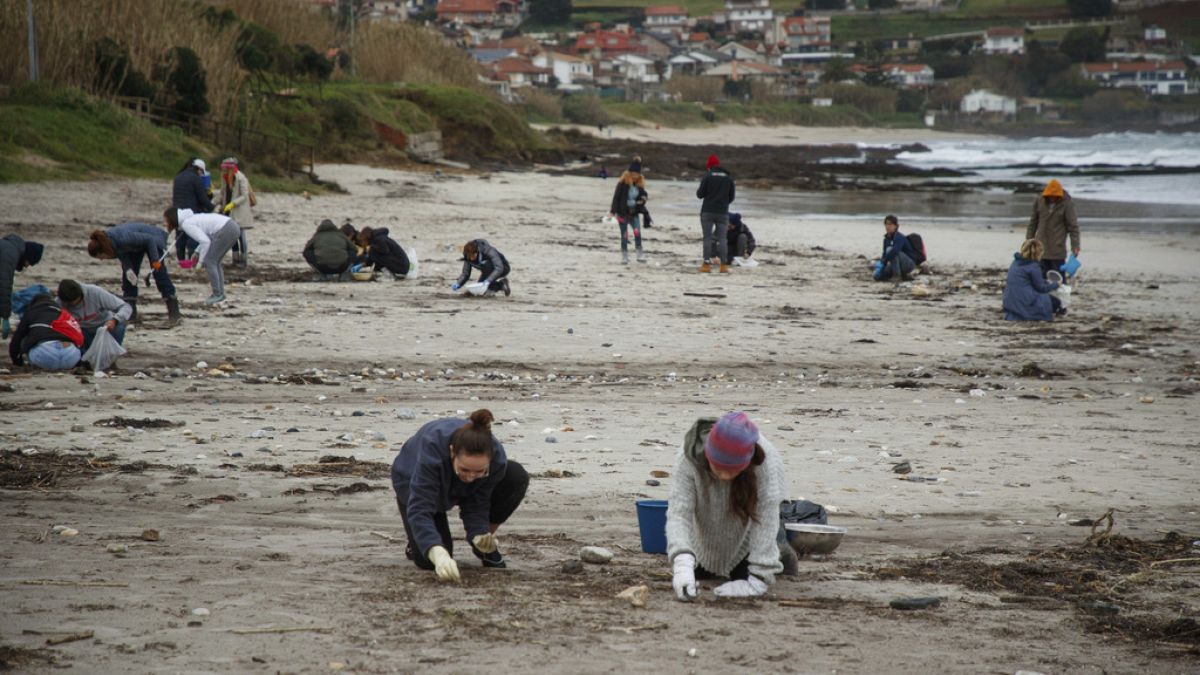Proposed legislation to reduce the accidental release of microplastic pellets into the environment should be extended to cover shipping, an overwhelming majority of EU governments agreed today – setting them on collision course with the European Parliament and Commission.
Environment ministers reached a joint negotiating position today on the proposal, designed to help meet the EU’s goal of reducing overall microplastic pollution by 30% before the end of 2030, which was tabled by the European Commission in October 2023.
Less than three months later, huge volumes of plastic pellets – produced from petrochemical companies and the raw material for the manufacture of plastic goods – began washing up on beaches in the Spanish region of Galicia after a ship sailing under a flag of convenience lost half a dozen containers overboard in heavy weather.
- Spain declares environmental emergency over plastic pellets spillage from ship
Spain, unsurprisingly, was in favour of including shipping in the scope of the new regulation, with ecology minister Sara Aagesen saying it was a matter of the “utmost importance” and would send out an “important signal” to Spain’s international partners in the International Maritime Organization, the UN body governing global shipping.
Madrid could support the compromise even if the 24-month transitional period before the law takes effect was extended to three years for the maritime sector, Aagesen said – a remark echoed by several other ministers at the EU Council summit in Brussels.
Governments agreed that serious or repeated breaches of new rules on safe transport and reporting where health or the environment is jeopardised should lead to fines of at least 3% of a company’s EU turnover, with governments retaining the prerogative to launch criminal proceedings.
Dissent from Greece and others
Not all governments were happy with the extension of the rules to international shipping, however, with maritime nation Greece hoping for a change of tack during subsequent talks with MEPs and the Commission over the final form of the text. Athens issued a statement – endorsed by Cyprus and Malta and seen by Euronews – for inclusion in the official record.
The ministers of the three countries pointed out during the debate in Brussels today that no impact assessment had been conducted. “This is contrary, inter alia, to the fundamental principles of subsidiarity and proportionality,” they wrote, arguing this position was supported by European case law.
They argued that the EU should seek a global agreement within the IMO as a first line of attack, rather than seeking to influence ongoing talks by acting unilaterally. Latvia put forward a similar argument in a separate statement expressing “serious concerns” of its own.
Other sources of pollution
Several ministers welcome the inclusion of a review clause calling on the EU executive to assess whether other major sources of unintentional microplastic pollution – notably tyres and paints – were being sufficiently addressed in existing EU legislation.
The intentional use of plastic particles in products ranging from cosmetics and toothpaste to artificial sports pitches has been dealt with in a separate regulation, also designed to contribute to the overall 30% reduction target.
Today’s intergovernmental agreement – which saw Hungary’s environment minister Anikó Raisz widely praised for brokering a deal – came despite broad antipathy directed towards Budapest throughout a six-month EU Council presidency that has been mired in controversy from day one.
“The Hungarian presidency wishes to pass a solid council position to our Polish colleagues to lay the ground for negotiations with the European Parliament,” Raisz said.
Commission remains opposed
The European Parliament has already agreed the law should extend to shipping, but the European Commission – technically not a legislative body – remains determined to try and reverse the decision in tripartite negotiations that will begin under the Polish president next year.
“Maritime transport is international by nature, so any solution needs to be designed in a way that it does not jeopardise the competitiveness of European industry,” environment commissioner Jessika Roswall told ministers at the start of the debate. “We believe that this requirement will not work in practice,” she said.
It is difficult to estimate the scale of pellet losses in Europe, but the Commission estimate the figure was somewhere between 52 and 184 thousand tonnes in 2019 alone – a tremendous volume when one considers the localised spillage of a mere 26 tonnes was enough for Spain to declare an environmental emergency last year.

